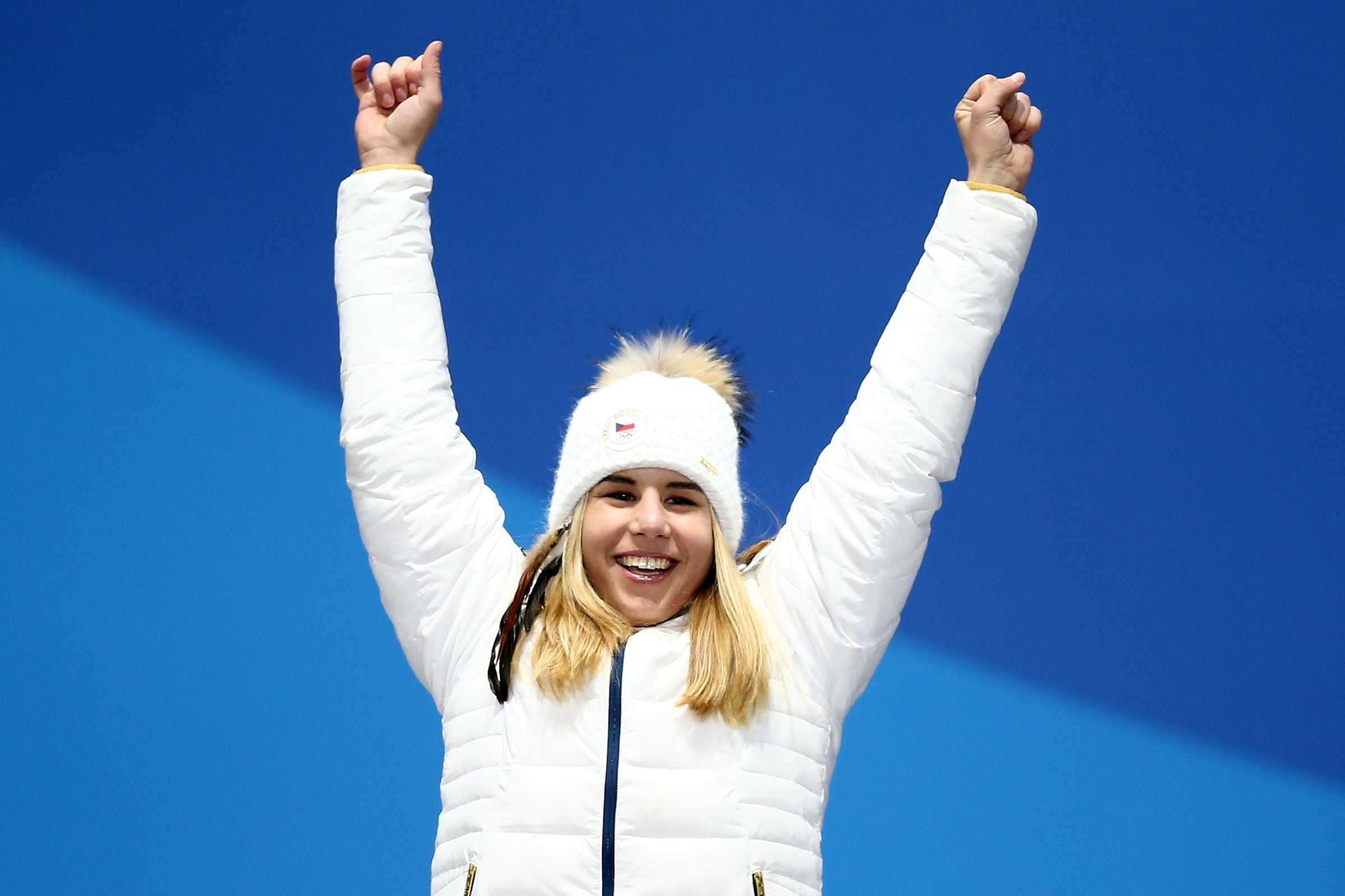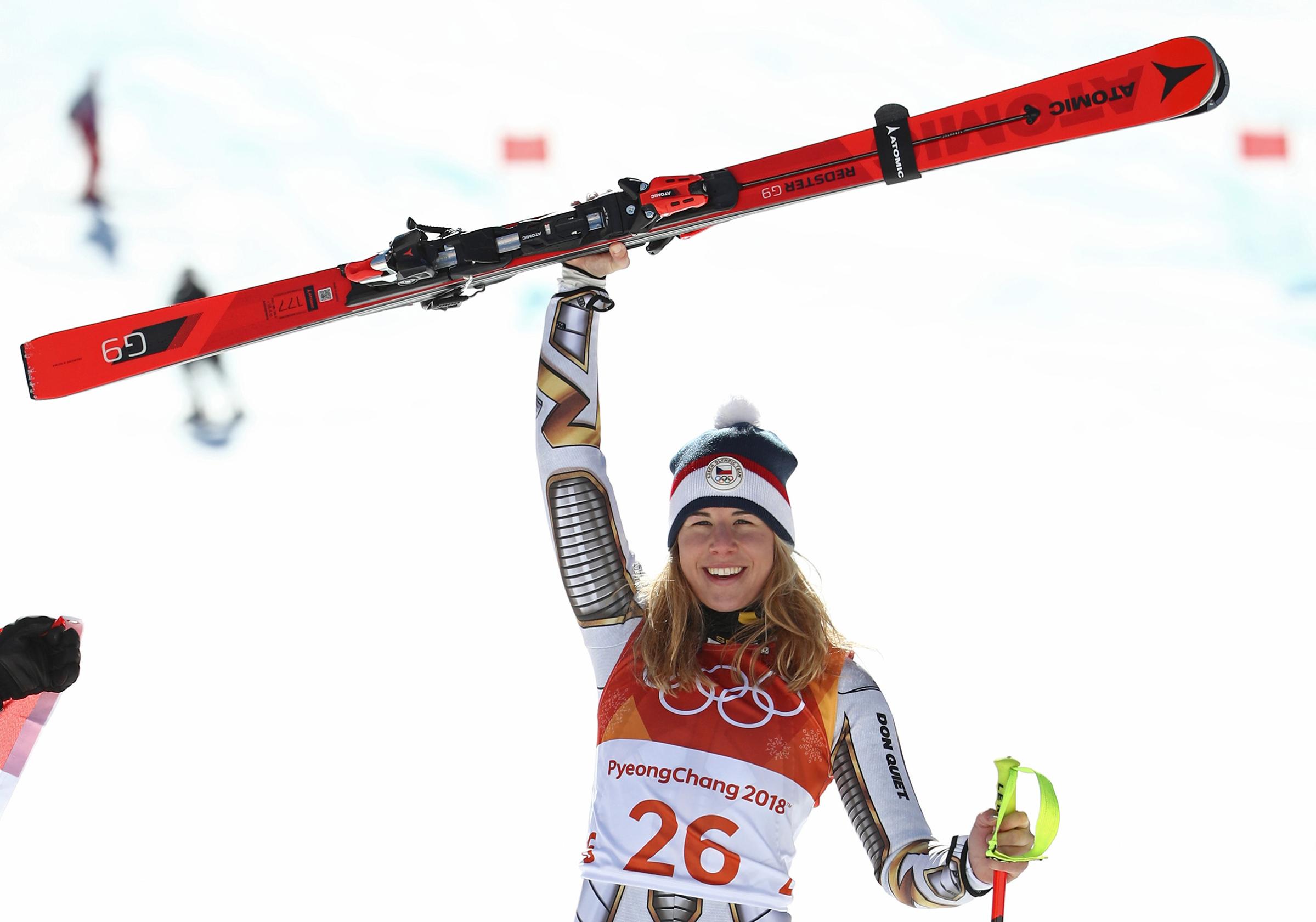
Can Ester Ledecka pull off the improbable, if not impossible? That’s the question pretty much no one thought they’d be asking at the PyeongChang Winter Olympic Games. But perhaps the best pure athletic achievement of these Olympics — and one of the most impressive feats in Olympic history, actually — could occur on Saturday afternoon at the Phoenix Snow Park in PyeongChang. Czech snowboarder Ester Ledecka will race in the parallel giant slalom event, where she’s a world champion and an Olympic favorite. This competition, usually an afterthought to most of the world, is suddenly must-see TV, as Ledecka tries to become the first athlete to ever earn medals in skiing and snowboarding,
Last Saturday, Ledecka shocked the world by winning her alpine ski race, the Super G, beating out sixth-place finisher Lindsey Vonn, among others. Skiing is supposed to be her weaker sport. Suddenly, she was an Olympic champion. Even she couldn’t quite believe it.
“I felt it was a mistake,” she said afterward. “I was just waiting for them to change the time. Everyone was screaming. I thought, ‘OK, now it’s weird’. She didn’t take off her goggles at the post-race press conference because, she said, she “wasn’t prepared to be at the ceremony and I don’t have makeup on.” She treated herself to fried chicken after her upset win.
Ledecka comes from a prominent Czech family. Jan Klapac, her grandfather, is an Olympic hockey player who won bronze in 1964, and silver in 1968, with the Czechoslovakian team. Her dad, Janek Ledecky, is a Czech pop music star who wrote a musical version of “Hamlet” that was a hit in both the Czech Republic and, ironically enough, South Korea (it also appeared off-Broadway in 2004).
“Everybody knows his name,” says Stanislav Nemecek, a website development manager from Prague who was hanging around the Czech House hospitality area recently, which had become a popping scene across the street from the Athletes Village in Gangneung.
Ledecka started skiing when she was two, and snowboarding at age five.
“From the start, there were a lot of people who would say, ‘You cannot do both; you need to specialize, otherwise you will never reach a higher level,'” Ledecka told the New York Times. “Since I was 14, I already had these discussions with my coaches about, ‘you need to choose and blah blah.’
“And I said, ‘No, I want to go in both and if it matters to you that I do both, then I need to choose another coach because this is the way I will do it.'”

Ledecka’s pursuit of two golds, in the same Olympics, in both skiing and snowboarding might not be as mind-blowing as, say, a curler and cross-country skier pulling off a double. Still, don’t dismiss the difficulty of this feat. The two sports are somewhat related, like cousins, but they require different footwork and body motions. And every time Ledecka trains in one sport, she’s costing herself practice in the other.
Ledecka’s quest has brought worldwide attention to parallel giant slalom, which takes place on Saturday in South Korea. After qualification runs, the 16 fastest racers curve around two identical courses, racing head-to-head in a knockout tournament. Ledecka is the defending parallel giant slalom world champion, and is ranked number one in the world in the discipline.
And she’s all the talk at the Czech House in Gangneung, where the Pilsner flowed on a recent evening. The houses’s walls commemorated the country’s top Olympians, like Jiri Raska, who won a ski jumping gold at the 1968 Olympics in Grenoble, France and the 1998 Czech hockey team, which captivated the central European nation by winning the first Olympic tournament featuring NHL players. A virtual reality headset walks you through a tour of Czech history; it highlights Otto Wichterle, inventor of soft contact lenses, and the peaceful separation of the Czech Republic and Slovakia in 1993.
“Czech people may not seem as expressive as Americans when you first meet them,” says Nemecek. “But one you talk to us, we’ll open up. Americans go and start speaking the first moment you meet them.”
Ledecka’s the talk of Czech House, which has become a gathering place for athletes and fans from all over the world, given its proximity to the Olympic village. One Czech fan pounded their chest, when asked what Ledecka means to the country — she’s our heart.
“When people think of us, they think of Prague and Pilsner,” says another fan, Markeva, while heading out the door. She said she was too busy to give her last name. “Now, they’ll know Ester.”
Especially if she pulls off the double.
More Must-Reads from TIME
- Donald Trump Is TIME's 2024 Person of the Year
- Why We Chose Trump as Person of the Year
- Is Intermittent Fasting Good or Bad for You?
- The 100 Must-Read Books of 2024
- The 20 Best Christmas TV Episodes
- Column: If Optimism Feels Ridiculous Now, Try Hope
- The Future of Climate Action Is Trade Policy
- Merle Bombardieri Is Helping People Make the Baby Decision
Write to Sean Gregory/Gangneung at sean.gregory@time.com